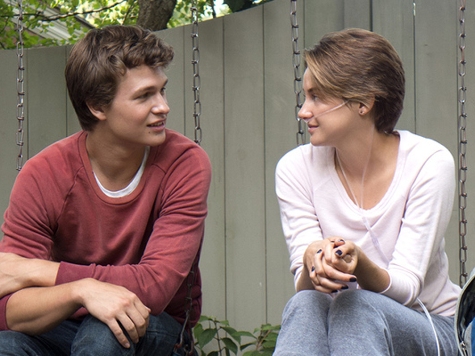Throughout the late 50’s and early 60’s, there were a number of “death discs” or “teenage tragedy songs” that romanticized the intensity of teen love when mixed with premature death. The fad began in 1959 with Mark Dinning’s #1 smash “Teen Angel,” which resulted in the expected flood of similar recordings. By the time “Leader of the Pack” was released in 1964, there was a parental backlash (the United Kingdom banned the song outright).
For obvious and legitimate reasons, parents were concerned that romanticizing an early death was an unhealthy message for teens already dealing with the heightened emotional confusion that comes with being a normal teenager. There are plenty of good things to say about director Josh Boone’s romantic and heartfelt “The Fault In Our Stars,” but an unsettling undercurrent kept me from embracing it outright: There’s nothing trendy or fashionable about death, especially a premature one, but “Fault” sure makes it seem that way.
Filled with hip dialogue and endless attempts at piercing insights wrapped in teen-speak, “The Fault In Our Stars” stars a marvelous Shailene Woodley as Hazel Grace Lancaster, a 17 year-old living on borrowed time. At 13, an experimental drug saved her from terminal Stage 4 thyroid cancer. Her lungs are shot, though, and her burden is the weight of an oxygen tank she takes everywhere and the knowledge she is unlikely to reach the age of 25.

Gus Waters (Ansel Elgort) is another story. After losing his lower leg to bone cancer, he is now cancer-free and has been for 18 month. His bout with oblivion (a major theme throughout) has given the handsome 18 year-old an appreciation for life, which he embraces with a larger-than-life enthusiasm and optimism that starkly contrasts with Hazel’s cynicism and growing depression. Hazel doesn’t see herself as a victim. She’s just dealing with her fate a little too realistically; biding her time, resigned to not having a future.
Hazel’s loving mother Frannie (Laura Dern) pretty much forces Hazel to attend a teenage Christian cancer support group. Gus shows up one day to support a friend and is immediately smitten with Hazel. From there a sincere, romantic, achingly tender (and doomed) love affair begins.
Though overlong and something that would not seem out of place debuting on the Lifetime Movie Network, “Fault” is nonetheless very affecting, thanks in large part to the chemistry of the two leads whose romance is surprisingly old-fashioned. Both are virgins, that first kiss takes a while, and we even watch them enjoy what we assume is their first drink (champagne). Moreover, Gus is Hazel’s white knight in all kinds of ways. He certainly saves her from wasting the time she has left. But he also makes it his mission to make her dreams come true.

It’s rare to see a movie anymore that portrays suburban, two-parent families as normal, functional and loving. That’s not to say there isn’t conflict, but both Gus and Hazel come from solid homes. Gus even uses strange words like “sir” and “ma’am.”
There are some missteps. Hazel (and the movie) mock the goofy but good-hearted Christian who leads the cancer support group. This feels out of place in a story otherwise overflowing with humanity. As a reclusive author (Hazel’s favorite) Willem DaFoe’s drunken misanthrope is a walking cliché. After a while, Hazel’s voiceover, which is filled with precious, smarter-than-thou insights, does start to grate. Teens don’t talk this way; they want to talk this way.
Some things work, though, that really shouldn’t. A visit to the Anne Frank house at first seems heavy-handed until you see how it plays out. There’s also the John Hughes-style dream date at an elegant restaurant. But the sense you’ve seen this a hundred times before quickly fades as your heart starts to slowly rip in two.
“Fault,” however, is very successful where it matters most. You want this young couple to be together, and after they are, you want to delay the terrible and inevitable almost as much as they do.
The terrible does come, and when it does the movie throws the kitchen sink right through the screen (including a pop soundtrack certain to make as much money as the movie) and works a little too hard to break your heart. By then, though, resistance is futile.
Follow John Nolte on Twitter @NolteNC

COMMENTS
Please let us know if you're having issues with commenting.